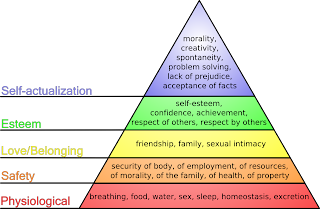Language is needed for the fulfilling of (personal and collective) dreams. The human being is a social animal and therefore we have to rely on language.
One very helpful illustration for this is Maslow's hierarchy of needs (see picture & credits). On every level of the pyramid language is playing an important role. In our world-society, based on the division of labor, language is already an important factor, starting from the beginning. However, in the OECD-countries language means normally the language of the national society. These "language containers" are got more penetrable lately, but they are still very much in place. Therefore "language" means first the particular language of this country. In my case, living in Japan it is Japanese. But of course as a German living in Japan, German is still in use for me. But there is also a reason to use English: In my case it is because I care about international politics. And as Greta Thunberg (Wp) reminds us (international politic public): The climate crisis (Wp) and its disastrous consequences is the urgent (international) political issue in our time. The effects of the climate crisis are already noticeable, but is going to be worse and worse in the years to come. Therefore I would like to ask the young people, what they think about that? Are they angry like Greta? And also related to this: How are the language choice(s) affected? For younger people language-learning can be seen as an investment in the future. Are the political relations of the English language effecting the language choice? Or is English more seen as a language, which is helping to forward the own career? Can there be a combination of both?

No comments:
Post a Comment